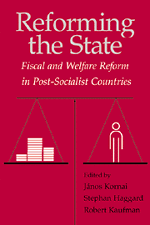Introduction
Published online by Cambridge University Press: 05 June 2012
Summary
Countries of the former Soviet Union and Eastern Europe are now entering the second decade of political transformation and economic reform. The first decade was marked by the dramatic disintegration of the Soviet empire, severe macroeconomic problems, and, in many countries, hyperinflation. At the same time, countries in the region undertook transitions to democratic rule. This combination of economic crisis and “extraordinary politics” by no means led to uniform outcomes, but it did create opportunities for reformers to initiate fundamental economic transformations.
The transition from command to market economies has unfolded through a series of overlapping policy and institutional reforms. Attempts to adjust fiscal, monetary, and exchange-rate policies constituted one feature of the initial phase of reform, as governments wrestled with severe fiscal and balance-of-payments disequilibria. At the same time, many governments also began a complex set of microeconomic reforms that have been at the center of the literature on the transition to the market. Some of these reforms, such as the adjustment of relative prices through decontrol and liberalization of trade, took place relatively quickly. The reform of property rights through privatization and the rehabilitation of state-owned enterprises has necessarily been more prolonged and is very far from complete.
These challenges are still relevant as we enter the next decade of transition; as the economic crisis of 1998 in Russia demonstrated clearly, some countries are still grappling with macroeconomic stabilization and dismantling of the state sector.
- Type
- Chapter
- Information
- Reforming the StateFiscal and Welfare Reform in Post-Socialist Countries, pp. 1 - 22Publisher: Cambridge University PressPrint publication year: 2001
- 5
- Cited by



